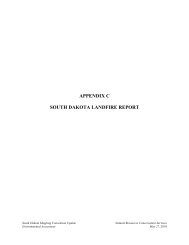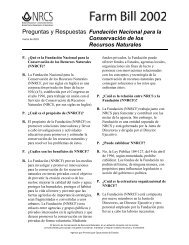Pilot Project for Value-Added Product Development from Solid ...
Pilot Project for Value-Added Product Development from Solid ...
Pilot Project for Value-Added Product Development from Solid ...
You also want an ePaper? Increase the reach of your titles
YUMPU automatically turns print PDFs into web optimized ePapers that Google loves.
those markets can realistically bear, is key to developing a strategy to implement<br />
alternative technologies on swine farms.<br />
Against this backdrop, the overall project objective was to institute pilot projects and<br />
conduct analyses to assess the technological and economical viability of two promising<br />
value-added products generated <strong>from</strong> animal waste solids on farms that had installed<br />
innovative waste treatment technologies. The specific objectives included:<br />
(1) Evaluating the production and use of soil amendments derived <strong>from</strong> composted<br />
swine waste solids;<br />
(2) Evaluating the production of worm castings that used swine-waste solids as a feed<br />
source to determine the price of production and whether the production complies<br />
with EST technical per<strong>for</strong>mance standards as well as the currently proposed<br />
environmental per<strong>for</strong>mance standards <strong>for</strong> new and expanding swine farms; and<br />
(3) Assembling and evaluating market data to analyze the demand <strong>for</strong> an array of<br />
related swine-waste-solids-derived value-added products (i.e., worm castings, soilless<br />
media, fertilizers, etc.), the potential <strong>for</strong> growth of the market, and the potential<br />
profitability of each market.<br />
<strong>Project</strong> Activities<br />
The project activities were structured into three main areas: (1) the production of the soil<br />
amendment products (compost and vermicompost); (2) the cost analysis of the production<br />
processes; and (3) the analysis of the market potential <strong>for</strong> these same value-added products.<br />
The large-scale production of thermophilic compost was conducted by Super Soil Systems<br />
USA under the direction of Dr. Ray Campbell. Mr. Bob Binkley headed the ef<strong>for</strong>ts to<br />
demonstrate the large-scale production of vermicompost <strong>for</strong> NatureWorks Organics.<br />
Adrian Atkins and Dr. Mitch Renkow, both in the Agricultural and Resource Economics<br />
Department at North Carolina State University, per<strong>for</strong>med the cost analysis of the cost of<br />
producing the soil amendment products. Their analysis was structured to account <strong>for</strong> the<br />
cost of construction, operation and maintenance costs of the pilot systems, and projections<br />
of how cost would change if the technologies were implemented industry wide. The Cost<br />
Analysis Report can be found in Appendix A of this report.<br />
Mary Muth, Melanie Ball and Anthony Lentz, at RTI International in conjunction with<br />
Brian Murry, at the Nicholas Institute <strong>for</strong> Environmental Policy Solutions at Duke<br />
University, conducted the market analysis. The market analysis was per<strong>for</strong>med to estimate<br />
the amount of the various products (<strong>from</strong> worm castings and the various soil amendments<br />
<strong>from</strong> Super Soil composting) that the soil amendment market could potentially bear,<br />
anticipated demand and potential market growth, and potential <strong>for</strong> market saturation. This<br />
report is found in Appendix B.<br />
4
















